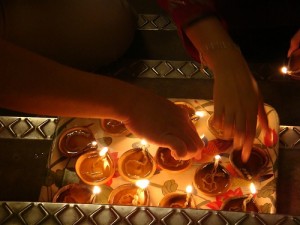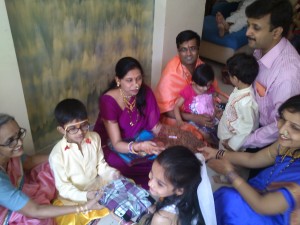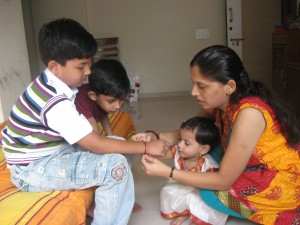Guest Post by Sandeep Kotwal of Mumbai, India
Introduction from Alana:
As I have discussed repeatedly, I believe that networking is an essential tool for all professionals, globally. That said, though I have presented my Coffee Lunch Coffee networking platform to diverse, multi-cultural groups from around the world, I am aware that my personal purview is most definitely an American version. As such, I often wonder how well my approach to networking translates outside the United States. It is against this backdrop that I fell into conversation with my friend, Sandeep Kotwal, from Mumbai, India. I asked Sandeep how networking manifests itself in his native land. And, while I recognize that he certainly does not stand as an ambassador for an entire nation, it was meaningful to me to get the perspective of one person who readily embraces establishing connections with others.
Sandeep did a beautiful job of explaining to me that, in his opinion, “social networking,” as he refers to it, is best expressed through India’s many festivals. With his permission, I share an excerpt of his remarks to me. Enjoy!
Oh, and if you have personal knowledge of the way networking works in another culture, I would love to hear from you! Comment on this post or email me at Alana@CoffeeLunchCoffee.com.
Alana, it was fun to stumble onto the topic of social networking during our chat this evening. I enjoyed thinking about how the culture in our respective countries shapes how we connect with others. The first thing that occurs to me is the significance of light in all our festivals. The important piece to note as it pertains to social networking is that an initial lamp, once illuminated, can

light the wicks of all other lamps… without losing any of its initial strength and, in fact, together, the bright lamps make the environment even brighter. So too are connections among human beings, don’t you think? As one person shares of him or herself with others, they lose none of their strength, but, in fact, gain additional power by having brought value to others’ lives.
Through our discussion, I came to understand that social networking in India is very natural as all of our religious festivals are designed specifically for that purpose. A land of varied cultures, festivals and festivities, India boasts at least one holiday each month! Though the language changes every 100km, as does culture and beliefs, we still celebrate festivals with great enthusiasm and stay connected to our near and dear ones.
Whether it is the shimmering lights of Deepavali (a.k.a. Divali), the colors of Holi, the extravaganza of Durga Puja, Navaratri, Onam, Dusshera, Id Ul Fitr or Christmas, one will encounter indigenous customs, amazing Indian cuisine and total festive abandonment. With so many religions and cultures, one will come across fairs, celebrations and merrymaking of all kinds.
The festivals are not only personal, family and social occasions of fun and merriment, but also focus on prayer and worship of

various gods and goddesses. To supplement this spiritual drive, various functions are organized that give variety and entertainment in life and grounds for social networking; in fact, they are often organized around farming seasons. At the end of the harvest, for example, once their prayers are rewarded with bountiful grains, cereals and lentils, maize and oil seeds, people’s joy knows no bounds. Spontaneously, young and elderly, men and women, boys and girls, are all jubilant. To express their outright joy, to express their gratitude to mother earth, to express social solidarity with one another, people organize wonderful festivals.
An amazing variety of festivals take place all over the country from Baisakhi and Holi in the north-west, Dasera and Diwali in mainland, Pongal and Onam in south, and Durga Puja in north-eastern states of India. There are also mega-festivals that last for days and involve masses of people (e.g., Ganesh Chaturthi, Navratri, Durga Puja and Diwali).

Taking us back to where we began, however, let’s turn once again to the importance of light. I return to the lights of Deepavali which are displayed at entrance doors, by the walls of houses, in the streets and lanes. Lights signify the inner spiritual light of the individual reflected outside the self. Light is used for the benefit of society. With light, passers-by may be prevented from stumbling. Feeding empty stomachs, lighting blown-out diyas (little clay lamps) and bringing light to those whose lives are in darkness is the true spirit of Deepavali. During the night of Deepavali the myriad diyas seem to silently send forth a message: “Come, let us remove darkness from the face of the earth.” One lamp can light several others. You can even light another 1,000 lamps, and still the flame and the light of the first lamp retains its original strength and brilliance. By becoming manifold, the light loses nothing but passes on its illumination to other lamps that it empowers.
Suffice it to say the culture in India is very rich and provides many avenues for showing gratitude toward nature, and respect, love and interconnectedness with family and friends, near and far. All these festivals have “morphine” in the air – this is where relationships form, connections are made and business gets done. The retail marketers spare no occasion to capitalize on it! This is the time when new products get launched; new culinary delights are discovered, old friends are reunited. People working all over the world come back home to celebrate their festivals, love springs among the teenagers and new avenues of income spring up with new connections, new joy. The cultural activities during the festivals are also a place to show the amazing talent of artisans and their craftsmanship. With more sponsorship and more money being invested into the occasions, festivals have become a combination of religious, corporate and social events. But, most importantly, all festivals bring together friends and families from around the world and are the biggest time to indulge in the important practice of networking.
Nice article
Yes!!! its true that most or every Indian activity is relates to modern world .like festival also you can mention Jatra(in English it synonyms as conference)in Karnataka all villages celebrate Jatra for once in a year in jatra all villagers neighbors join and conducts some cultural and devotional activities.
whatever people of India love to be in network with friends and family than any other country.
Very nice artidle – meticulously drafted. Interested to hear more from you.
Looking forward to hear more from you.
a beautiful piece relating social networking with our own culture
Awesome, Social networking will always take a big leap in the times to come…Agree with the article and Sandeep’s views…
Lets be a part of this 🙂
Very Nice!! well written!
There’s no doubt Indian festivals do provide immense opportunities to know and connect people….
Well connected…!!!
Social networking is the next big industry….huge potential.
Interesting article!
In this new age where people believe more in socializing and networking on Facebook, Twitter, LinkedIn, etc. your article throws light on the value of our culture.
Fantastic one Sandeep. True that 🙂
Its a great informations shared. i strongly agree that networking is important and is the basis even that link to many business. As such these festival also means alots to diverse tpyes of human races and cultural to share, respect and love for one other as human being. Well done guys…
I love this post! Very astute observations of the form of networking in another culture. Would love to share my thoughts on my culture with you too Alana!
Ambereen, Thanks for your comment. I can’t wait to hear more and to learn from you. Cheers! – Alana
Nice reading. India is a rich country where festivals all around the states are celebrated in various ways. Durga Puja in Bengal is teh biggest festival and other than networking it is also important to note the calibre of people who organize it. Its really a commendable act to showcase one’s craetivity in puja pandals, in teh Durga idol and moreover in teh organiser’s capability to run the show. Bengalis all over teh wworld come and visit their homes and this is the time to renew bonds with each other. People fall in love , make business partnership, rejuvenates friendship and creates new relationship. Foreigners should come and visit India during that time.